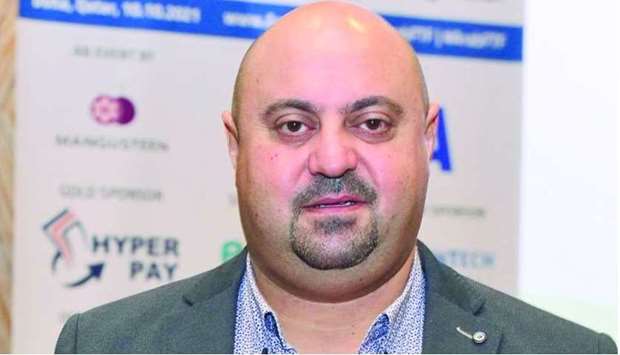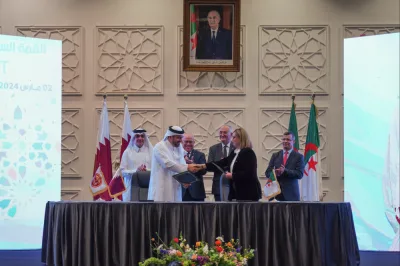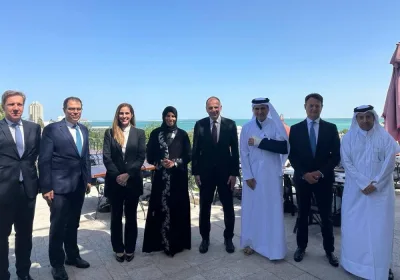HyperPay, a robust online payment gateway that drives the future of cashless payments in the Middle East and North Africa (Mena) region, is foraying Qatar in order to cash in on the umpteen opportunities, especially in view of the 2022 FIFA World Cup.
"We are coming to Qatar very soon. We are in talks with Qatar Fintech Hub (QFTH) regarding this," HyperPay chief executive Muhannad Ebwini said on the sidelines of the first Arab Fintech Summit.
Contemplating to go either solo or with a partner; he said HyperPay finds great potential for fintechs in Qatar, which is an advanced country that offers the latest technologies.
QFTH is a global fintech hub with a purpose to support the development of the fintech industry in Qatar.
HyperPay, which is headquartered in Riyadh, has offices in Dubai, Amman, Cairo and Bahrain, processing millions of transactions a year for thousands of merchants across almost every industry verticals. It had seen a 300% growth in 2020 and expects it to replicate this year too.
Asked how the company views Qatar as a potential target, especially in view of the 2022 FIFA World Cup, which is aimed to be cashless transactions event; he said for fintech, it is a big opportunity, especially for B2B and B2C wallets, booking engines, gathering platforms and transportation.
The company, which has won Finnovex award in recognition of its commitment to staying ahead in the fintech space and continuously enhance the online payment solutions to provide merchants with convenient and secure payment acceptance experiences, finds big opportunities, especially in payments in Qatar, for which it would adopt open banking technologies.
"We will go after the open banking technologies which is a new technology that is coming as this will ensure better opportunities for everyone in the chain and make things easier by offering bank solutions to end customers," he said.
The open banking connects banks, third-parties and technical providers, enabling them to simply and securely exchange data to the benefit of customers.
Asked about the outlook of banks in Qatar towards fintechs; he said they are eager to have new technologies and innovation as they are seized of the opportunities available for the fintechs in the region.
He said the strategy has always been partnering with as many banks as possible so that its clients and merchants would have the ability to choose the bank they prefer to deal with.
Stressing that it would soon have a presence in Qatar; Ebwini said "any office we start usually will have 8-10 headcounts to begin with" and would be scaled up, depending on the business volumes and expansion plans.
"Our international operations are supported by offices in Jordan and Egypt," he added.
Ebwini said in each country, there are multiple localised solutions that could be offered, depending on the situations and rules of each company.
Earlier addressing a panel on ‘The Pandemic Impact on Fintech Industry', Ebwini said the pandemic had created space for the fintechs as he explained during the peak of Covid-19 last year, the volumes of online transactions had increased considerably and that the Middle East has reached a point of maturity in digital transactions.
“Once the pandemic started peaking, the online transaction volumes started increasing 100% and 200%. The retailers who don’t have e-channels started approaching fintechs to promote their products online,” he said.
Highlighting that many jurisdictions in the region have started unlocking measures to a great extent, he said still 50% growth is there for online as retailers find that "online is not a luxury any more".
Disclosing that its business grew 300% last year and hope that level to be maintained this year, Ebwini said “I think this will continue in the coming two to three years because more people are now coming online for digital transactions.”
"The (pandemic) impact was positive for HyperPay," he said, disclosing that its official target was 200% growth in 2020 compared to 2019.
In terms of increased sales, mobile wallets have contributed significantly: from retailer-personalised applications to wallets from financial institutions, device manufactures and technology platforms.
The Middle East region is now in the “maturity” stage of digital transactions, according to him.
"We are coming to Qatar very soon. We are in talks with Qatar Fintech Hub (QFTH) regarding this," HyperPay chief executive Muhannad Ebwini said on the sidelines of the first Arab Fintech Summit.
Contemplating to go either solo or with a partner; he said HyperPay finds great potential for fintechs in Qatar, which is an advanced country that offers the latest technologies.
QFTH is a global fintech hub with a purpose to support the development of the fintech industry in Qatar.
HyperPay, which is headquartered in Riyadh, has offices in Dubai, Amman, Cairo and Bahrain, processing millions of transactions a year for thousands of merchants across almost every industry verticals. It had seen a 300% growth in 2020 and expects it to replicate this year too.
Asked how the company views Qatar as a potential target, especially in view of the 2022 FIFA World Cup, which is aimed to be cashless transactions event; he said for fintech, it is a big opportunity, especially for B2B and B2C wallets, booking engines, gathering platforms and transportation.
The company, which has won Finnovex award in recognition of its commitment to staying ahead in the fintech space and continuously enhance the online payment solutions to provide merchants with convenient and secure payment acceptance experiences, finds big opportunities, especially in payments in Qatar, for which it would adopt open banking technologies.
"We will go after the open banking technologies which is a new technology that is coming as this will ensure better opportunities for everyone in the chain and make things easier by offering bank solutions to end customers," he said.
The open banking connects banks, third-parties and technical providers, enabling them to simply and securely exchange data to the benefit of customers.
Asked about the outlook of banks in Qatar towards fintechs; he said they are eager to have new technologies and innovation as they are seized of the opportunities available for the fintechs in the region.
He said the strategy has always been partnering with as many banks as possible so that its clients and merchants would have the ability to choose the bank they prefer to deal with.
Stressing that it would soon have a presence in Qatar; Ebwini said "any office we start usually will have 8-10 headcounts to begin with" and would be scaled up, depending on the business volumes and expansion plans.
"Our international operations are supported by offices in Jordan and Egypt," he added.
Ebwini said in each country, there are multiple localised solutions that could be offered, depending on the situations and rules of each company.
Earlier addressing a panel on ‘The Pandemic Impact on Fintech Industry', Ebwini said the pandemic had created space for the fintechs as he explained during the peak of Covid-19 last year, the volumes of online transactions had increased considerably and that the Middle East has reached a point of maturity in digital transactions.
“Once the pandemic started peaking, the online transaction volumes started increasing 100% and 200%. The retailers who don’t have e-channels started approaching fintechs to promote their products online,” he said.
Highlighting that many jurisdictions in the region have started unlocking measures to a great extent, he said still 50% growth is there for online as retailers find that "online is not a luxury any more".
Disclosing that its business grew 300% last year and hope that level to be maintained this year, Ebwini said “I think this will continue in the coming two to three years because more people are now coming online for digital transactions.”
"The (pandemic) impact was positive for HyperPay," he said, disclosing that its official target was 200% growth in 2020 compared to 2019.
In terms of increased sales, mobile wallets have contributed significantly: from retailer-personalised applications to wallets from financial institutions, device manufactures and technology platforms.
The Middle East region is now in the “maturity” stage of digital transactions, according to him.




